
7 Reasons I Eat Cultured Vegetables
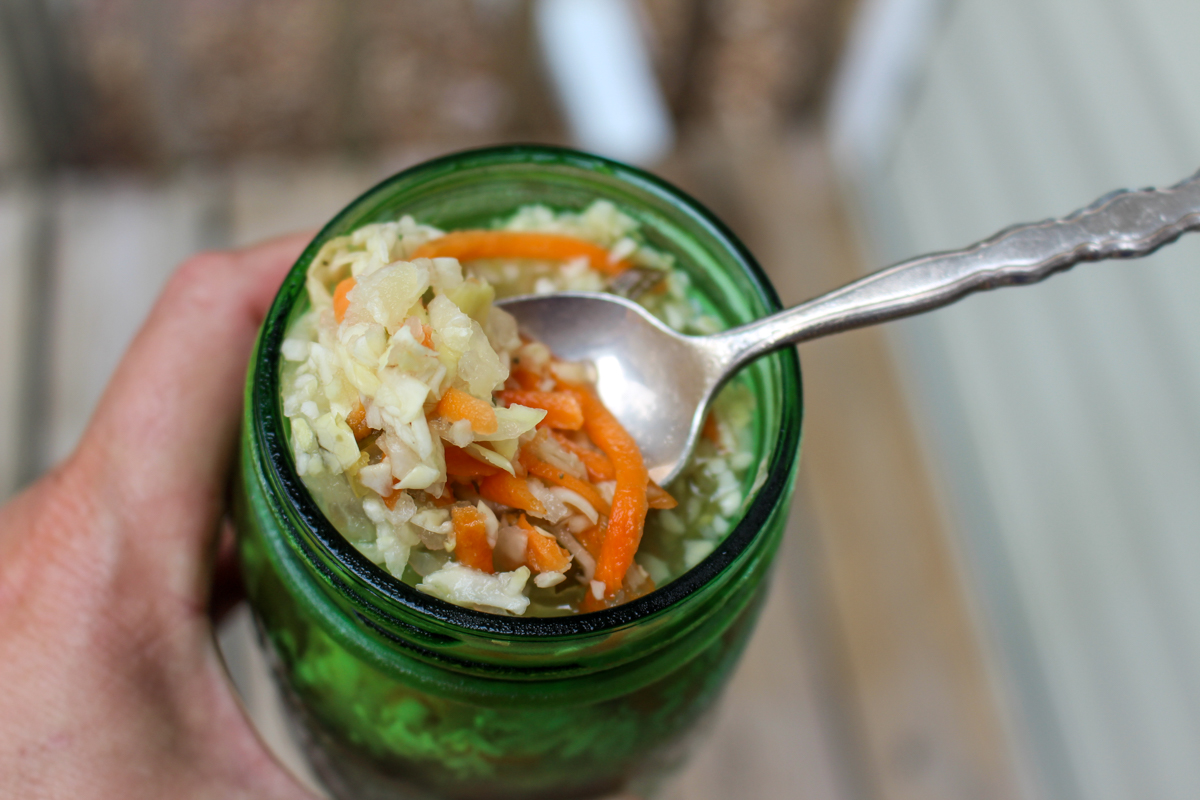
Cultured vegetables have special powers that go far beyond regular vegetables. I love them and reach for them day after day and in times of special need. They can be powerful food – like medicine – and so I always have several jars in my refrigerator. I encourage you to do this as well; because there will come a time when you will need their help and like me, you will be so thankful you made some. Then you will be convinced of their special abilities and you won’t have to take my word for it. Everybody knows vegetables are good for you, but cultured veggies go far above regular vegetables. Check out the reasons I eat cultured vegetables and trust me . . . you want a jar in your fridge. You won’t regret it.
Seven Reasons I Eat Cultured Vegetables
1. Seasonal allergies
![]() In the springtime, I up my intake of cultured foods to help with seasonal allergies. One of the things I learned about being allergic to pollen is the immune system is overreacting to a substance that is harmless, such as pollen, and produces antibodies that attack the allergen. If you strengthen the immune system, the allergies subside. I reach for foods high in vitamin C all throughout the day to support my immune system and when I do, my allergies are no more. Cultured vegetables are loaded with vitamin C. Vitamin C is a water-soluble vitamin which means the body doesn't store it. When you have allergies, your body uses huge amounts of vitamin C to help the adrenals cope with the stress. Have some cultured veggies and other foods high in vitamin C all through the day and watch your allergies disappear. One more thing, stay away from sugar as it drops your immune system by 75%!
In the springtime, I up my intake of cultured foods to help with seasonal allergies. One of the things I learned about being allergic to pollen is the immune system is overreacting to a substance that is harmless, such as pollen, and produces antibodies that attack the allergen. If you strengthen the immune system, the allergies subside. I reach for foods high in vitamin C all throughout the day to support my immune system and when I do, my allergies are no more. Cultured vegetables are loaded with vitamin C. Vitamin C is a water-soluble vitamin which means the body doesn't store it. When you have allergies, your body uses huge amounts of vitamin C to help the adrenals cope with the stress. Have some cultured veggies and other foods high in vitamin C all through the day and watch your allergies disappear. One more thing, stay away from sugar as it drops your immune system by 75%!

2. Safest and best food method to preserve vegetables
![]() For thousands of years, it was the process of fermentation that made possible the safe storage of food. The good microbes in cultured foods become so strong and dominant that they keep pathogens and harmful bacteria out. It’s how people made their food safe before refrigeration. They would often bury their vegetables in the ground to keep them cool and preserve the probiotics.
For thousands of years, it was the process of fermentation that made possible the safe storage of food. The good microbes in cultured foods become so strong and dominant that they keep pathogens and harmful bacteria out. It’s how people made their food safe before refrigeration. They would often bury their vegetables in the ground to keep them cool and preserve the probiotics.
U.S. Department of Agriculture research service microbiologist Fred Breidt says properly fermented vegetables are actually safer than raw vegetables, which might have been exposed to pathogens like E. coli on the farm. “With fermented products, there is no safety concern. I can flat-out say that. The reason is the lactic acid bacteria that carry out the fermentation are the world’s best killers of other bacteria,” says Breidt, who works at a lab at North Carolina State University, Raleigh, where scientists have been studying fermented and other pickled foods since the 1930s.
Breidt adds that fermented vegetables, for which there are no documented cases of food-borne illness, are safer for novices to make than canned vegetables. Pressurized canning creates an anaerobic environment that increases the risk of deadly botulism, particularly with low-acid foods.
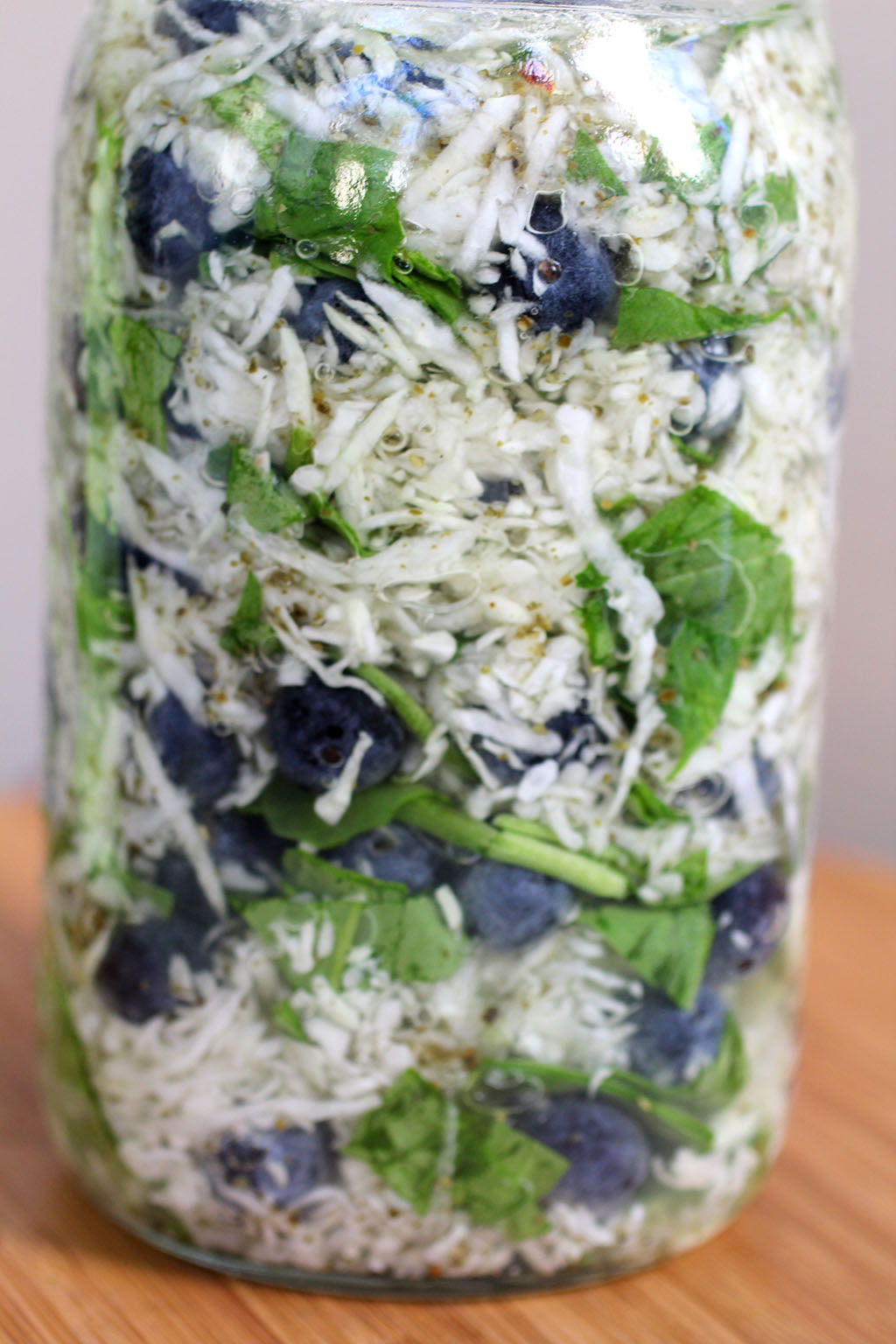
3. Adds vitamins and minerals
![]() When you culture or ferment your cabbage into sauerkraut, the vitamin C and antioxidant levels go through the roof.1 Researchers at Cornell University tested levels of antioxidants and vitamin C in sauerkraut and found the average level of vitamin C in raw cabbage was 57 mg per cup, but when fermented the level was close to 700 mg! Vitamin C is also an antioxidant and it protects the body against stress and helps boost the immune system.
When you culture or ferment your cabbage into sauerkraut, the vitamin C and antioxidant levels go through the roof.1 Researchers at Cornell University tested levels of antioxidants and vitamin C in sauerkraut and found the average level of vitamin C in raw cabbage was 57 mg per cup, but when fermented the level was close to 700 mg! Vitamin C is also an antioxidant and it protects the body against stress and helps boost the immune system.
All cultured vegetables are wonderful sources of vitamin C. But cabbage, collards, and kale have the most and when you ferment them, you get more! Not only do you get more vitamin C when you culture your vegetables, but the fermentation process also increases the nutrient availability in vegetables. This is due to the good bacteria (microflora) that are required to digest and utilize your food.
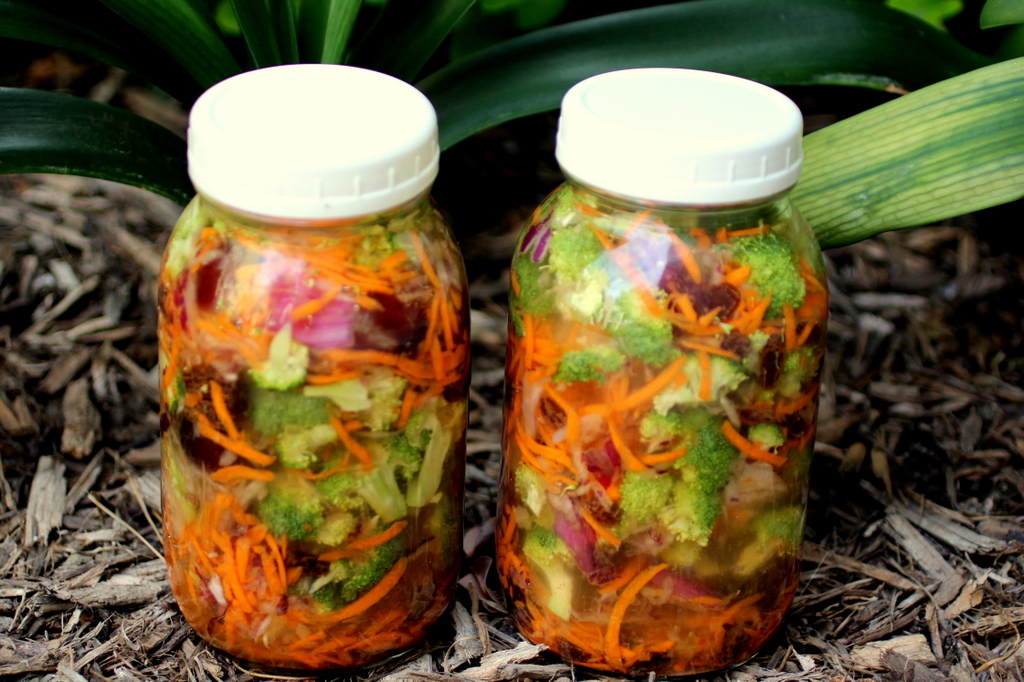
4. Strengthens the good bacteria, kills harmful pathogens
![]() The superstar bacteria in cultured vegetables is called Lactobacillus plantarum (L. plantarum). It is extremely hardy, survives stomach acid with ease, and can make the full trip from your mouth – to your intestines – to your colon – to colonize you in a powerful way. L. plantarum is a welcome guest that works mightily for you by fiercely attacking pathogenic (bad) bacteria in your body. It will strengthen your good bacteria by killing the bad guys, and then it helps your own good bacteria grow stronger, and helps you to be more resistant to future invasions of pathogens. It's important to note that this is a transient bacteria which means it will only last a few days in the body so it's important to have it often.
The superstar bacteria in cultured vegetables is called Lactobacillus plantarum (L. plantarum). It is extremely hardy, survives stomach acid with ease, and can make the full trip from your mouth – to your intestines – to your colon – to colonize you in a powerful way. L. plantarum is a welcome guest that works mightily for you by fiercely attacking pathogenic (bad) bacteria in your body. It will strengthen your good bacteria by killing the bad guys, and then it helps your own good bacteria grow stronger, and helps you to be more resistant to future invasions of pathogens. It's important to note that this is a transient bacteria which means it will only last a few days in the body so it's important to have it often.
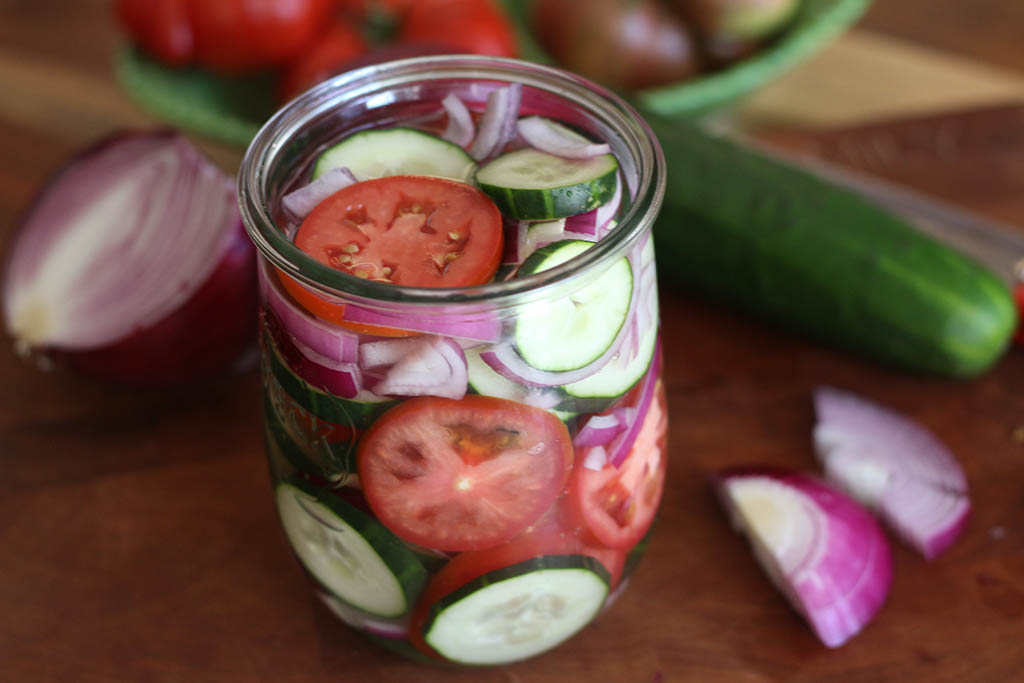
5. Removes pesticides
![]() It's exciting that microbes can help us by removing pesticides from our vegetables. It can be a hardship for people to always buy organic, but the healthy bacteria L. plantarum can remedy this. L. plantarum helps remove pesticides from non-organic vegetables. [2] The L. plantarum bacterial strains studied from fermented vegetables in kimchi were found to be capable of degrading four different organophosphorus insecticides by using them as a source of carbon and phosphorous. [3]
It's exciting that microbes can help us by removing pesticides from our vegetables. It can be a hardship for people to always buy organic, but the healthy bacteria L. plantarum can remedy this. L. plantarum helps remove pesticides from non-organic vegetables. [2] The L. plantarum bacterial strains studied from fermented vegetables in kimchi were found to be capable of degrading four different organophosphorus insecticides by using them as a source of carbon and phosphorous. [3]
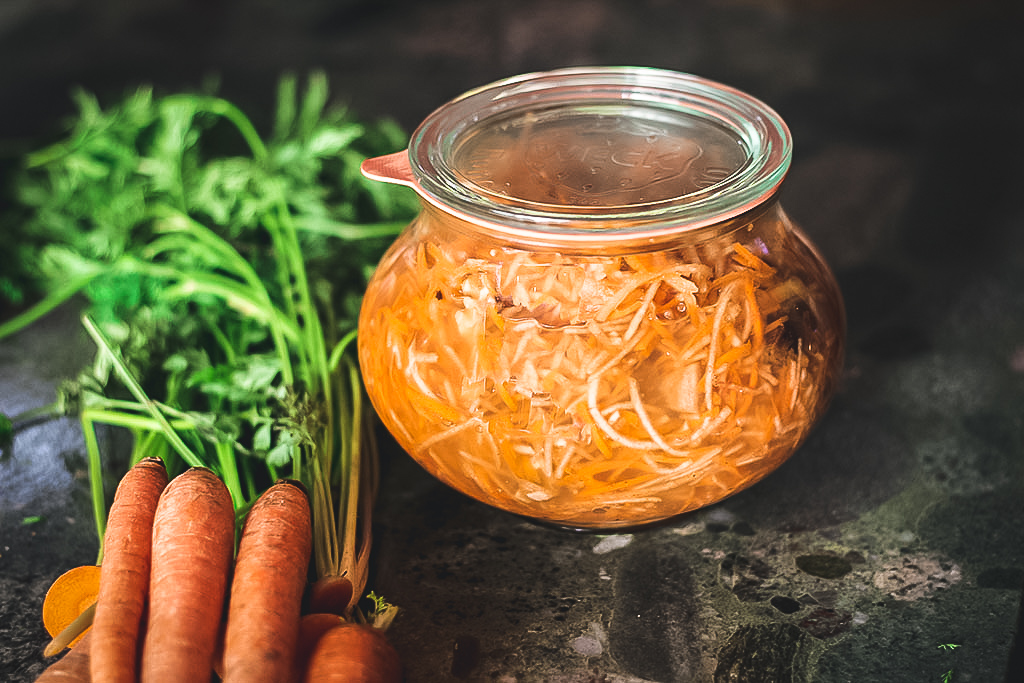
6. Stomach distress of any kind
![]() L. plantarum is pretty powerful and can even knock out food poisoning4,5 (as I myself have witnessed). It has been studied and found successful in the inhibition of food poisoning and pathogenic bacteria, and it is being studied for use in improving the microbiological safety of foods. It's also superior for any kind of stomach distress. I've seen this again and again and received so many emails of stories telling me how effective it was in stopping vomiting, stomach cramps, and nausea with just a spoonful of the brine or vegetables. Try it and it will make you a believer, too. Nothing works better for stomach distress.
L. plantarum is pretty powerful and can even knock out food poisoning4,5 (as I myself have witnessed). It has been studied and found successful in the inhibition of food poisoning and pathogenic bacteria, and it is being studied for use in improving the microbiological safety of foods. It's also superior for any kind of stomach distress. I've seen this again and again and received so many emails of stories telling me how effective it was in stopping vomiting, stomach cramps, and nausea with just a spoonful of the brine or vegetables. Try it and it will make you a believer, too. Nothing works better for stomach distress.
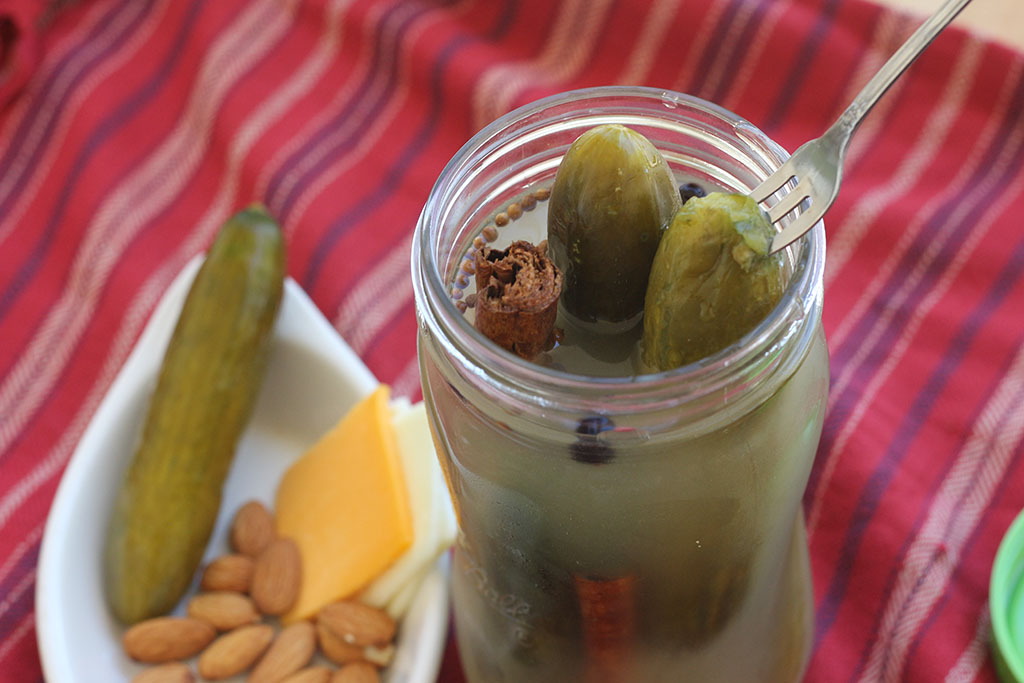
7. Cancer prevention
![]() In 2005, a team of researchers in Poland and the United States studied two groups of young Polish women: one group had immigrated to the United States, and one had not. They found that the rate of breast cancer was three times higher for those in the U.S. than for those still living in Poland. Further studies concluded that the consumption of cultured sauerkraut was a possible factor in the differing rates of cancer. Women in Poland ate an average of 30 pounds of cultured sauerkraut each year, while the women in the U.S. ate less than 10 pounds per year. Why does this matter? Sauerkraut contains high levels of glucosinolates, which have been shown to have anticancer activity in laboratory research.
In 2005, a team of researchers in Poland and the United States studied two groups of young Polish women: one group had immigrated to the United States, and one had not. They found that the rate of breast cancer was three times higher for those in the U.S. than for those still living in Poland. Further studies concluded that the consumption of cultured sauerkraut was a possible factor in the differing rates of cancer. Women in Poland ate an average of 30 pounds of cultured sauerkraut each year, while the women in the U.S. ate less than 10 pounds per year. Why does this matter? Sauerkraut contains high levels of glucosinolates, which have been shown to have anticancer activity in laboratory research.
Other studies have focused on estrogen metabolism and the enzymes in sauerkraut and its juices. A 2012 study conducted by biochemist Hanna Szaefer and her colleagues looked at the ability of the enzymes in cabbage and sauerkraut to change the expression of the P450 enzyme, which metabolizes estrogen but is also carcinogenic. Their research supported the idea that the consumption of sauerkraut was a beneficial food for the prevention of breast cancer in women.6
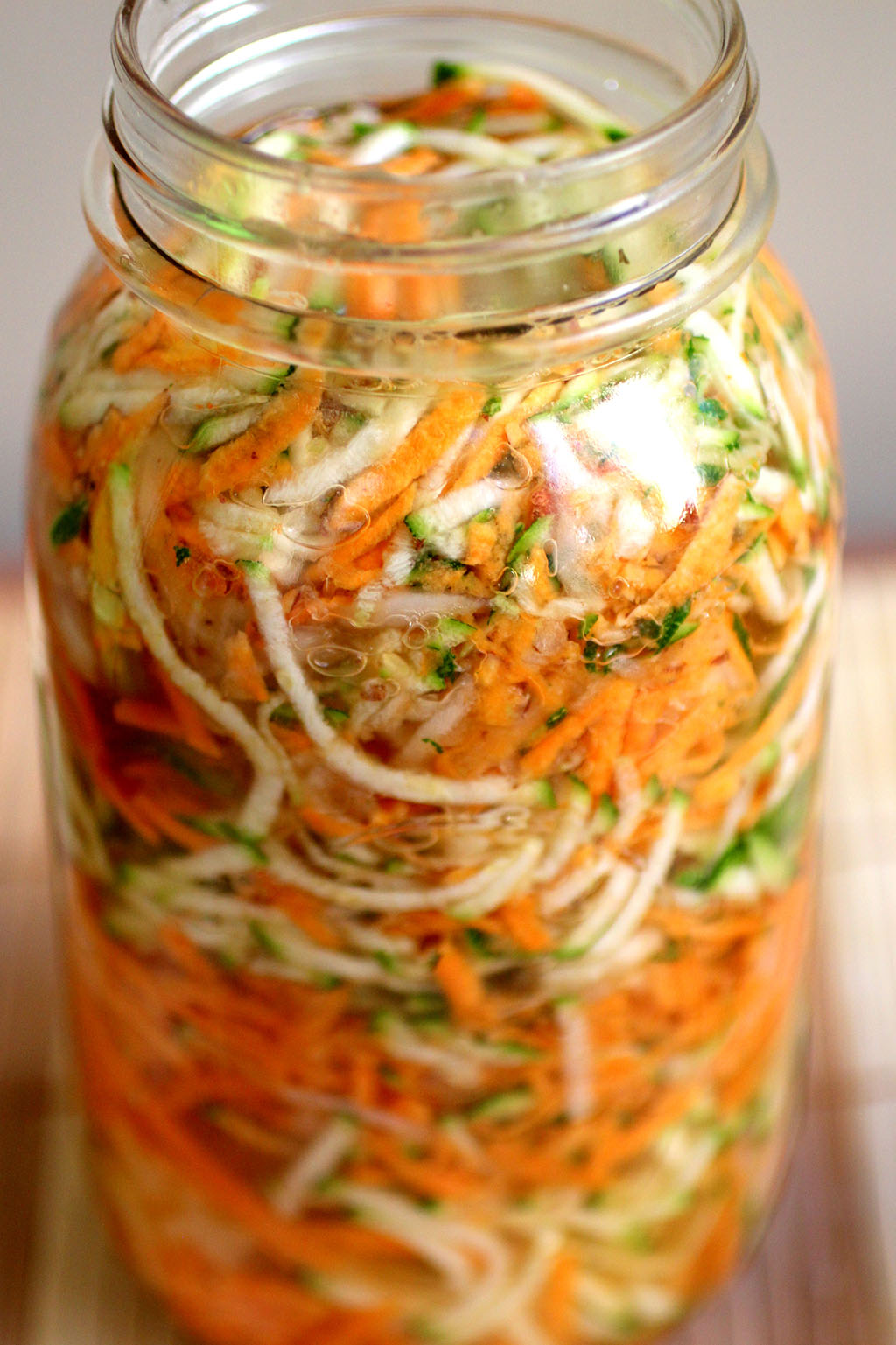
Listen To My Podcast
Cultured vegetables have special powers that go far beyond regular vegetables. They can be powerful food – like medicine – and here’s why you should have a jar in your fridge, and a fun recipe to try.
References:
- Chun, O. K., Smith, N., Sakagawa, A., & Lee, C. Y. (2004). Antioxidant properties of raw and processed cabbages. International journal of food sciences and nutrition, 55(3), 191-199.
- http://articles.mercola.com/sites/articles/archive/2011/07/16/this-food-helps-you-to-detox-pesticides.aspx
- http://www.greenmedinfo.com/blog/nasty-pesticide-wheat-degraded-probiotic-used-culturing-food-1
- http://www.sciencedirect.com/science/article/pii/S0956713507001703
- http://agris.fao.org/agris-search/search.do?recordID=KR2010002575
- H. Szaefer et al., “Modulation of CYP1A1, CYP1A2 and CYP1B1 Expression by Cabbage Juices and Indoles in Human Breast Cell Lines,” Nutrition and Cancer 64, no. 6 (August 2012): 879–88.
Are you on the list?
Sign up today and I'll send you my free Getting Started Guide!
Each week I'll send you updates, tips, recipes, and more! You might even be a winner of my weekly giveaway! (starter cultures, memberships, and more!)
Come be a part of my cultured food family!


